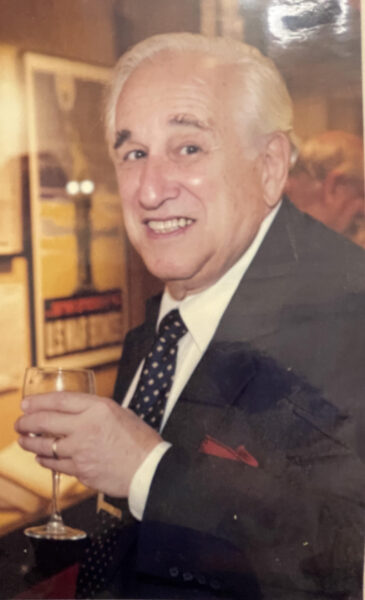It is with great sadness for his passing in December, and admiration for his lifetime of scholarly work, that I write this tribute to Henry L. Feingold, who spent most of his career at Baruch College, City University of New York.

Henry L. Feingold. Photo courtesy Feingold family
A key figure in the field of American Jewish history, and notably the first historian to tackle systematically the issue of American refugee policy in the face of Nazi persecution of the Jews, Henry contributed much to our understanding of the intersections of foreign policy, domestic politics, Nazism, and modern and American Jewish history through his many lectures, conference presentations, and his book The Politics of Rescue: The Roosevelt Administration and the Holocaust, 1938–1945 (Rutgers Univ. Press, 1970). The book, which grew out of his New York University doctoral dissertation, involved meticulous combing of the archives of the US Department of State.
Born in Ludwigshafen, Germany, Henry fled with his parents to the United States at age seven. Educated in the New York public schools, he received his BA and MA from Brooklyn College in 1953 and 1954, respectively. He then taught at Brooklyn’s Samuel J. Tilden High School and served in the US Army from 1954 to 1957. Here he was assigned the task of interrogating defectors from the German Democratic Republic, East Germany. Upon returning to civilian life, he enrolled in the doctoral program at New York University, studying under Henry Bamford Parkes. He received his PhD in 1966.
Henry went on to a long and distinguished career, teaching US diplomatic history and American Jewish history at Baruch College and the CUNY Graduate Center. His passionate concern with trying to understand the actions and inactions of the Roosevelt administration in response to Hitler continued well beyond The Politics of Rescue. He published Bearing Witness: How America and Its Jews Responded to the Holocaust (Syracuse Univ. Press, 1995) as well as numerous articles on the subject. With that history always on his mind, he opened scholarly discussion on the involvement of the American government and American Jews with the Jews of the Soviet Union. In 2007, Henry published “Silent No More”: Saving the Jews of Russia, the American Jewish Effort, 1967–1989 (Syracuse Univ. Press, 2007). In all these studies, he asked historians to contemplate the contexts of inaction and to make sense of the mix of the possible and the impossible when states face each other and confront evil.
His interest in and commitment to the field of American Jewish history extended well beyond themes of rescue, activism, and diplomacy. Henry helped build the field from its previous state as an enterprise marginal to both American history and modern Jewish history. This history, as Henry presented it, involved rich, complicated, and fascinating issues of integration, community building, adjustment to new circumstances, and intense discord among Jews.
He did this most importantly in his superb editorship of the Johns Hopkins University Press series The Jewish People in America. A five-volume endeavor, to which he contributed the volume covering the period 1920–45, the series made the point that the experience of the Jews in America helps historians and others understand American history in its complex entirety and the global history of the Jews since the 17th century. He had the difficult task of imposing consistency on the individual books so that they held together as a coherent whole, while encouraging innovation, creativity, and individual interpretation. He handled this with aplomb.
I had the immense honor to be included among the five authors of the series, writing the second volume, A Time for Gathering, which focused on 1820–80. He was a wonderful team member while also being a sharp and exacting editor. He encouraged me, as he did so many other younger scholars over the course of their careers. He asked hard questions while respecting good scholarship that offered interpretations different from his own.
Beyond what I hope will be the enduring legacy of his writing, editing, and service to a number of scholarly boards, Henry will be remembered for his humor, wit, and kindness. In conversations with others and his presentations at scholarly gatherings, he recognized that not everyone agreed with him, and he did not always agree with them, but he respected their dedication to the scholarly enterprise.
Hasia R. Diner
New York University (emerita)
This work is licensed under a Creative Commons Attribution-NonCommercial-NoDerivatives 4.0 International License. Attribution must provide author name, article title, Perspectives on History, date of publication, and a link to this page. This license applies only to the article, not to text or images used here by permission.